The Indian men's hockey team faced a disappointing end to their FIH Pro League campaign in Europe, managing only three points from eight matches after a promising start. This slump included a seven-match losing streak, raising concerns about the team's form. However, is it time to panic?
While the series of losses is undoubtedly concerning for the Olympic bronze medalists, a closer look suggests that there's no need for immediate alarm. Despite the unfavorable results, India remained competitive in most games, with the quality gap between them and their opponents not being drastically wide.

Six of the seven defeats were by a narrow one-goal margin, with crucial goals conceded in the dying minutes against the Dutch and Australia. While some matches saw India outplayed, in others, the outcome could have easily swung in their favor.
These results might be beneficial in the long run, occurring in the Pro League where the stakes are relatively lower. While a World Cup spot was at stake, India's primary qualification route remains the upcoming Asia Cup in late August. The Pro League losses offer Craig Fulton and the coaching staff valuable insights into areas needing improvement before crucial tournaments. India has shown resilience before, overcoming poor Pro League performances to achieve success, like their Olympic bronze medal win.
One key factor in India's struggles was their weakened defense, a cornerstone of Fulton's preferred playing style. The team conceded 26 goals in eight games, a significant increase from the 12 conceded in their earlier home matches.
Despite the presence of established defenders, costly errors such as failed clearances and mistimed tackles plagued the team's performance.
Goalkeeper Krishan Pathak's form also dipped, particularly in defending set-pieces, highlighting the absence of the experienced PR Sreejesh, known for his exceptional shot-stopping abilities and composure in crucial moments.
While wholesale changes to the squad aren't necessary, certain selection issues need addressing. The persistence with experienced forwards who struggled to make an impact raised questions, especially with promising youngsters like Shilanand Lakra demonstrating potential.
Fulton must evaluate whether young, talented attackers with international experience deserve a chance in the senior team before the Asia Cup.

Despite the setbacks, Abhishek emerged as a standout performer, solidifying his position as India's best forward. His exceptional ball-striking ability led to four goals, crucial in Harmanpreet Singh's absence due to injury.
Manpreet Singh's relentless commitment and experience also shone through, making him a likely candidate for next year's World Cup squad.
The focus now shifts to the Asia Cup, scheduled from August 27 to September 7. As the top-ranked team in Asia, India is expected to win the tournament and secure their place in the World Cup.
Newer articles
Older articles
 Gavaskar Urges India to Bolster Attack with Yadav for Second England Test; Bumrah Fitness in Focus
Gavaskar Urges India to Bolster Attack with Yadav for Second England Test; Bumrah Fitness in Focus
 Srikanth's Canada Open Upset; Gukesh Dominates Croatia GCT Blitz: Indian Sports News, July 5
Srikanth's Canada Open Upset; Gukesh Dominates Croatia GCT Blitz: Indian Sports News, July 5
 Rishabh Pant's Fearless Batting Revolutionizing Test Cricket, Says Greg Chappell
Rishabh Pant's Fearless Batting Revolutionizing Test Cricket, Says Greg Chappell
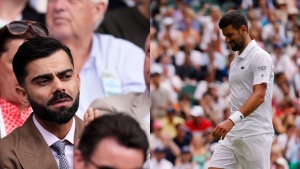 Djokovic Humbled by Kohli's 'Gladiator' Acclaim After Wimbledon Comeback Victory
Djokovic Humbled by Kohli's 'Gladiator' Acclaim After Wimbledon Comeback Victory
 Gujarat Cricket Association Set to Launch T20 League in 2025-26 Season
Gujarat Cricket Association Set to Launch T20 League in 2025-26 Season
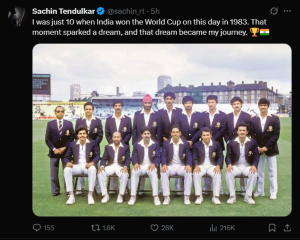 Tendulkar: 1983 World Cup Victory Fueled My Cricket Dream
Tendulkar: 1983 World Cup Victory Fueled My Cricket Dream
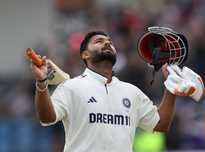 Greg Chappell: Rishabh Pant is Redefining Cricket with Explosive Batting
Or (depending on target audience):
Cricket Revolution: Greg Chappell Says Rishabh Pant is Changing the Game
Greg Chappell: Rishabh Pant is Redefining Cricket with Explosive Batting
Or (depending on target audience):
Cricket Revolution: Greg Chappell Says Rishabh Pant is Changing the Game
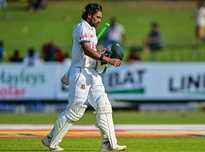 Bangladesh Test Captain Najmul Hossain Shanto Resigns Following Sri Lanka Defeat
Bangladesh Test Captain Najmul Hossain Shanto Resigns Following Sri Lanka Defeat
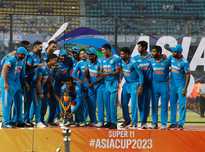 Asia Cup 2025: ACC Targets September Start Date Amid Easing Tensions
Asia Cup 2025: ACC Targets September Start Date Amid Easing Tensions
 Prithvi Shaw Opens Up About Career Slump: Admits to Distractions and Poor Choices
Prithvi Shaw Opens Up About Career Slump: Admits to Distractions and Poor Choices